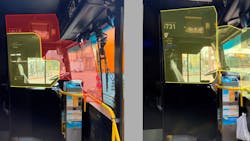The Los Angeles County Metropolitan Transportation Authority (L.A. Metro) and TriMet are improving safety on their systems.
L.A. Metro
At the end of 2024, L.A. Metro finished retrofitting all of its buses with new barriers that fully enclose and protect bus operators.
The authority became one of the first transit agencies in the U.S. to fully install the barriers on its buses after i attacks on bus operators started increasing. According to the Federal Transit Administration, the number of major assaults on transit workers tripled between 2008 and 2021. To accelerate the completion of the project, the L.A. Metro Board approved an emergency procurement action in April 2024, reducing the project timeline from up to three years to a few months.
Bus operators were involved throughout the project, as they were able to view prototypes of the barriers and learn about the project timeline through leadership sessions with the authority. L.A. Metro notes the barrier design, prototyping and much of the fabrication were completed in-house at the authority’s central maintenance facility (CMF) in downtown Los Angeles, and the barriers were installed by L.A. Metro staff at CMF and its operating divisions.
According to L.A. Metro, the barriers provide an extra layer of security for operators, protecting them from physical attacks and from behaviors such as spitting. Beyond physical safety, L.A. Metro Bus Operator Tracey Davis believes the barriers also minimize distractions for operators and deter bad behavior from the relatively few riders looking to make trouble. The authority says the barriers are constructed of steel and laminated, low-reflectivity shatter-resistant glass. To retrofit the entire fleet, L.A. Metro used about 55,000 square feet of glass. Some of the materials — including the tempered glass — were produced by contractors.
The authority says the bus barriers are already showing positive results. From April to September 2024, operators were 58 percent less likely to be assaulted on buses with fully enclosed barriers. During that time, L.A. Metro notes it also saw a significant decline in spitting incidents.
The $5.8 million project was funded by two of the sales tax measures that L.A. County voters have approved for L.A. Metro (the 1990 Prop C and the 2016 Measure M), as well as money from California’s Transportation Development Act.
In addition to the new barriers, L.A. Metro says it has implemented several other measures over the years to enhance operator safety, including:
- Onboard cameras, DVR systems and emergency buttons that operators can use to summon help.
- De-escalation training to help operators manage challenging situations.
- A “See Something, Say Something” marketing campaign to encourage riders to report issues and stay vigilant.
- Signage reminding passengers that assaults on operators are punishable by up to three years in prison, a $10,000 fine or both under California law.
- Dedicated bus riding security teams patrolling select lines.
TriMet
Illegal drug use on board transit vehicles in the state of Oregon, including on TriMet’s buses and trains, is now classified as a crime under the state’s Interfering with Public Transportation statute. The offense is now a Class A misdemeanor – the most serious of misdemeanors under Oregon criminal law – thanks to the implementation of Senate Bill (SB) 1553 on Jan. 1, 2025. TriMet says those found guilty face up to 364 days in jail, a $6,250 fine or both.
“What sets this drug law apart from others is its focus on public transit,” said TriMet General Manager Sam Desue Jr. “We believe public transit merits distinct treatment due to the greater harm on board drug use causes, as you cannot simply move away from it. This new law is helping make public transit vehicles into safe zones, where not only is drug use illegal, it comes with stiffer penalties.”
“Senate Bill 1553 provides law enforcement a valuable tool to address drug use on public transportation and in the community,” said Multnomah County Sheriff Nicole Morrisey O’Donnell.
TriMet notes the Oregon Legislature passed two laws in 2024 that recriminalized illicit drug use – House Bill (HB) 4002 and SB 1553. The agency says the laws gave law enforcement new tools to address open use of hard drugs, which has become both a public safety and a public health issue.
HB 4002 recriminalized the possession of small amounts of hard drugs, giving law enforcement the authority to cite and arrest people for the Class B misdemeanor of unlawful possession of a controlled substance. Those found guilty face up to 180 days in jail or, where offered, a drug deflection program.
TriMet says it continually works to improve security on its transit system, including:
- Doubling the number of safety, security and customer service staff on its transit system since 2022.
- Adding a 24-hour Security Operations Center, where dispatchers coordinate safety and security responses to issues such as vandalism and loud or disruptive behavior reported by riders via TriMet’s security hotline set up in 2023.
- Improving lighting at stations and parking lots, upgrading security cameras and installing blue-light security phones at some MAX stations that connect riders directly with the agency’s Security Operations Center.

Brandon Lewis | Associate Editor
Brandon Lewis is a recent graduate of Kent State University with a bachelor’s degree in journalism. Lewis is a former freelance editorial assistant at Vehicle Service Pros in Endeavor Business Media’s Vehicle Repair Group. Lewis brings his knowledge of web managing, copyediting and SEO practices to Mass Transit Magazine as an associate editor. He is also a co-host of the Infrastructure Technology Podcast.







